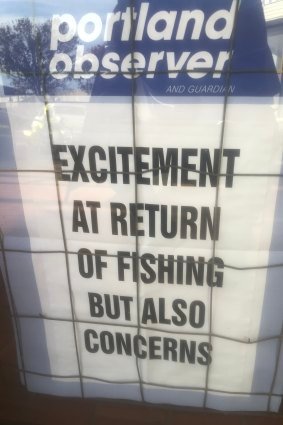One of the city reporters urgently drew me aside when I disembarked and offered me good money for the roll of film and any decent quotes I’d gathered.
No, I said. I was employed by the Casterton News. I owed my loyalty to the publisher who was paying me.
The fellow became snaky. He called me a fool, among other less polite descriptors.
I couldn’t fault his accuracy.
I wrote my story long-hand, with much colourful embellishment, and delivered it to my employer. He paid me a few cents a line for my scoop.
The Portland Observer and Guardian has been covering local issues for
182 years.Credit: Tony Wright
Journalism, I decided, was the job for me.
And so, a few years later, in 1970, self-conscious in a new three-piece suit, I stepped into full-time journalism, burdened with youth’s anxiety and dreams.
A fine old masthead had taken a chance and given me a cadetship: The Portland Observer and Guardian.
It had brought the news and told the stories of the people of Victoria’s first European settlement since its ancestor, the Portland Guardian and Normanby General Advertiser, was established in 1842. The Observer, which got its start in 1890, took over The Guardian in 1963, establishing a lineage that gives the Observer and Guardian the right to claim itself as the second-oldest Victorian newspaper still circulating, beaten by The Geelong Advertiser, established in 1840.
It seemed, when I walked into the little Observer office and sat proudly at a desk adorned by a typewriter that had seen better days, that the newspaper business must be the most secure around.
There was never going to be a shortage of news, and there would be no scarcity of people who wanted to read all about it, surely.
Court cases, car crashes, robberies, the shipping news, arguments between prominent citizens, weddings, births, deaths, council planning controversies, businesses starting up or going bust, youth going wild, footy in the winter, cricket in the summer and basketball, netball and fishing all year round – it would keep journalists employed forever.
Alas. It was the vanity of youth.
All these years later, forever turns out to have a limit.
Unless new owners can be found quick smart, Victoria’s far, far south-west corner will be without any local newspapers by Christmas, whatever their antiquity.
The dear little Casterton News, established in 1869, will be gone on December 18.
The final issue of The Portland Observer is to be printed on December 20.
The Hamilton Spectator, whose presses first ran in 1859, and which was delivered to our family’s home for decades, will go silent after December 21.
(The daily Warrnambool Standard remains, but it’s an hour to the east, which is definitely not local in a territory as parochial as this.)
Portland, Hamilton and Casterton staff, who provide their communities with an unusually rich supply of local news and sports reports, complete with fine pictorial spreads and features, will be made redundant. No merry Christmas for them.
Meanwhile, the papers, either separately or as a job lot, are being offered for sale by the local families and investors who own them.
It is, of course, a story familiar to regional and rural areas all around Australia.
More than 200 country papers have either closed or ceased printing over the past decade. Scores more are teetering.
Selling advertising is tough in the age of the internet, though ads tell stories, too, about the local economy and housing, for starters.
Loading
Printing presses are getting old, it’s expensive to replace them, and it would be a wild optimist who saw a sparkling future in print.
A couple of big media companies have snapped up numerous little papers over recent years and reduced many of them to publications run by editors operating several of them from a distance.
Owners of the few independent papers remaining, like the Spectator-Observer Partnership, particularly old families who haven’t registered a profit in years, have little interest in more haemorrhaging.
Local papers have served as the town square’s voice in regional towns and districts for so long that they, and the reliable news and information they roll out, week after week, have come to be taken for granted.
Meanwhile, too many would-be readers figure they can do their advertising and get their information from Facebook and their pictures from Instagram. And the old treasures slip quietly away.
Who’ll be down on the wharf at midnight now, slipping under the guard of outsiders because of something called the local edge?
And who will cover the footy and the cricket and developments in industry and agriculture, the council, the weddings, the births and the deaths and all the other things that make a local community tick along?
Here’s a scoop for free. No one really knows what they’ve lost until it’s gone.
Read the full article here
